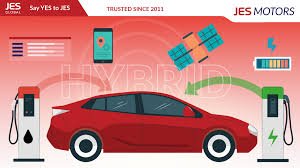
Hybrid vehicles have gained prominence as a bridge between traditional internal combustion engines and fully electric vehicles, offering improved fuel efficiency and reduced emissions. However, they also face challenges and present opportunities in the evolving landscape of automotive technology. This article explores the complexities of hybrid vehicles through a series of questions and answers.
Q1: What are the primary advantages of hybrid vehicles over conventional gasoline-powered cars?
A: Hybrid vehicles offer several advantages, including enhanced fuel efficiency and reduced emissions. By combining an internal combustion engine with an electric motor and battery, hybrids can achieve better mileage in city driving conditions where the electric motor operates efficiently. They also provide a smoother and quieter driving experience compared to traditional vehicles.

Q2: What are the key challenges in hybrid vehicle technology?
A: Hybrid vehicles face challenges such as the higher initial cost compared to conventional vehicles, due to the dual powertrain system and advanced battery technology. Additionally, the complexity of integrating multiple power sources requires sophisticated engineering and poses maintenance challenges. Battery life and performance in varying weather conditions also influence the overall efficiency and longevity of hybrid vehicles.
Q3: How do hybrid vehicles contribute to reducing environmental impact?
A: Hybrid vehicles reduce environmental impact by consuming less gasoline and emitting fewer pollutants compared to traditional vehicles. The electric motor assists the gasoline engine during acceleration and operates independently at lower speeds, minimizing fuel consumption and tailpipe emissions. This contributes to lower greenhouse gas emissions and improves air quality in urban areas.

Q4: What opportunities do hybrid vehicles present for the automotive industry?
A: Hybrid vehicles present opportunities for innovation and market growth in the automotive industry. Automakers can leverage hybrid technology to comply with stringent emission regulations and meet consumer demand for more fuel-efficient and eco-friendly vehicles. The development of plug-in hybrid electric vehicles (PHEVs) extends the electric-only driving range, offering flexibility for drivers without access to charging infrastructure.
Q5: How are advancements in hybrid vehicle technology addressing consumer concerns and preferences?
A: Advancements in hybrid vehicle technology focus on improving battery efficiency, enhancing driving range, and reducing charging times. Automakers are also integrating advanced features such as regenerative braking to capture energy during deceleration, improving overall energy efficiency. Enhanced connectivity and infotainment systems in hybrid vehicles cater to tech-savvy consumers seeking a seamless driving experience.

Table: Challenges and Opportunities in Hybrid Vehicles
| Aspect | Challenges | Opportunities |
|---|---|---|
| Cost | Higher initial purchase cost | Potential savings on fuel costs and tax incentives |
| Technology Complexity | Integration of dual powertrains | Innovation in battery technology and efficiency |
| Maintenance | Specialized servicing and maintenance requirements | Development of skilled workforce in hybrid tech |
| Battery Performance | Dependence on battery life and performance | Improvements in battery technology and lifespan |
